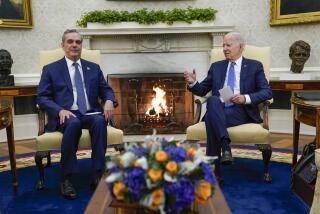Baker Admits Latin Debt Plan Failed, Urges New Strategy
- Share via
WASHINGTON — James A. Baker III, acknowledging that the global debt strategy he developed as Treasury secretary is not working, called Tuesday for new action to help Latin American nations reduce their huge debts and to dampen the threat to their democratic governments.
At confirmation hearings on his nomination as George Bush’s secretary of state, Baker said he was “disappointed” that the Baker Plan, as the United States’ current debt policy is known, “has not worked better than it has” in easing the Third World debt problem in the past few years.
“There is room for more of a creative financing mechanism that can result in a reduction in the stock of debt” of developing countries, he said.
The comments marked the first time that Baker has admitted publicly that his debt plan has fallen short. Underscoring earlier statements by Bush himself, they provide added impetus to a growing international consensus for a change in the global debt strategy.
The secretary-designate also hinted that the United States may try to assemble a broader economic aid program for Latin America, “perhaps assisted by our European and Japanese allies.” But he provided no details about what he might have in mind.
Major Policy Shift
Separately, Baker also indicated that the United States will go along with expected moves at an annual seven-nation economic summit conference in Paris next July to continue providing relief for sub-Saharan African countries on debts they now owe to the governments of industrialized countries.
And he hinted that the Bush Administration may be receptive to some sort of “new institutional arrangements” with Southeast Asian democracies to serve as a forum for improving economic and political relations. But he was deliberately vague about what that might entail.
The Bush team’s new focus on reducing the debt burden of developing countries marks a major shift in U.S. policy on the global debt issue--and appears to signal the start of a generally more accommodating approach to Latin America as a whole.
The original Baker Plan, which Baker outlined as Treasury secretary in October, 1985, sought to keep debt levels intact but to provide debtor countries with the money and policies to be able to handle them more easily.
But that notion foundered, partly because banks did not increase their lending to Latin American countries as they had promised and partly because the countries themselves did not keep their commitments to put their own economic houses in order.
Baker said Tuesday that both debtors and creditors now should be trying to find ways to reduce the overall size of the $1.3-trillion debt owed by less developed countries by negotiating agreements designed to discount some of the outstanding obligations.
He specifically called for more “voluntary” debt writedowns by commercial banks, to be hammered out in negotiations between the banks and debtor countries. He opposed mandatory debt-writedown schemes, as have been suggested by some lawmakers.
At the same time, however, Baker warned lawmakers that “there is no magic-bullet cure” for the debt problem and that debtor countries, too, must do their part by restructuring their economies to make them more efficient.
As reported earlier, a new Treasury Department plan is expected to call for changing existing tax laws and bank regulatory rulings to enable banks to accept such losses without incurring severe financial setbacks. Baker said he opposed using too many “taxpayers’ dollars” to ease the problem.
Economic Challenge
Baker’s nod to expected new efforts to provide debt relief for sub-Saharan African countries was a reference to a continuation of a decision at last year’s economic summit in Toronto to stretch out the debts they owe to rich countries’ governments almost indefinitely.
Both European countries and Japan are expected to propose further relief efforts at this year’s economic summit conference. Baker indicated that the United States will go along as much as the Administration’s budgetary guidelines will allow. The cost is relatively low.
In line with the shift in his job titles--from Treasury secretary to secretary of state--Baker described the debt problem as a political as well as economic challenge, warning that the debt burden of Latin American nations “overshadows” and “threatens” their fragile democracies.
Stressing that “foreign policy begins in our neighborhood, with the countries that border us,” he called for a “voyage of rediscovery” of the Caribbean and Latin America. He specifically mentioned the problems of Mexico, which he said is “deeply in debt and faces some serious challenges to its fabric.
“It’s time we regarded Mexico with the respect it warrants,” he told the Senate Foreign Relations Committee. “Our relationship with Mexico is as important as our relationship with any other country in the world. . . . We are determined to help.”
More to Read
Sign up for Essential California
The most important California stories and recommendations in your inbox every morning.
You may occasionally receive promotional content from the Los Angeles Times.








